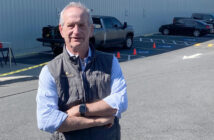Regional leaders weigh in on the Hard Rock Hotel & Casino Bristol’s potential to be transformational for the entire region
By Dave Ongie
Allie Evangelista, President of Hard Rock Hotel & Casino Bristol, is fond of saying nobody plans to go into the casino business.
When Evangelista was growing up in Brazil, she only knew she wanted to travel. She never laid eyes on a slot machine until she entered the gaming industry for the first time in 2006. Now she is ramping up operations for a temporary casino in Bristol that will eventually give way to a 90,000-square-foot permanent facility complete with a hotel, an outdoor entertainment venue with a capacity of 20,000 and a 3,200-seat performance venue in July of 2024.
In the same sense, none of the Bristol, Virginia residents who used to flock to the Bristol Mall to do their shopping could have guessed the mall would one day be vacant and they’d have a chance to cast a vote to replace it with a casino.
As former high school classmates Jim McGlothlin and Clyde Stacy were busy building their respective business empires, it seems doubtful they would have guessed they’d one day play an instrumental role in helping change Virginia state law to pave the way for a casino project aimed at providing a boost to Bristol, Virginia’s sagging economy.
Jasen Eige never could have guessed a casino project would bring him home to Bristol after a successful stint in Richmond. Delegate Israel O’Quinn didn’t know he’d one day carry legislation through Virginia’s House of Delegates that would bring Virginia’s first casino to Southwest Virginia.
Nobody plans to go into the casino business, but that doesn’t mean people don’t find it rewarding once they get there. As you’re about to find out, this isn’t just another business planting its roots in our region – it is the introduction of an entirely new industry, one that will require an ecosystem in and of itself, and that ecosystem is capable of providing economic benefits that spread throughout the Appalachian Highlands.
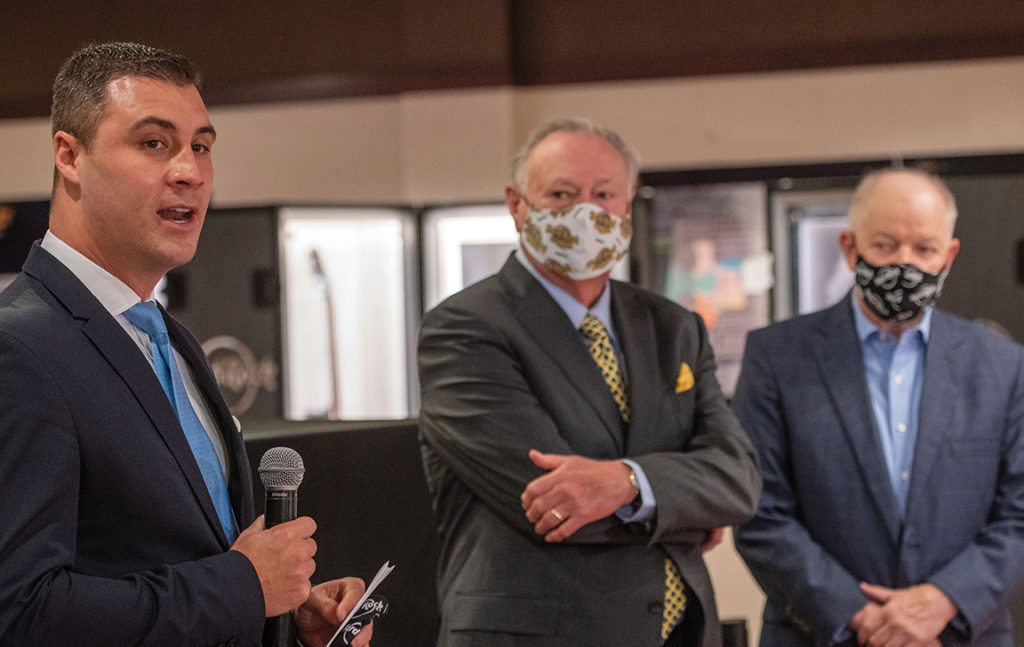
An Unseen Foundation
In November of 2020, voters in Bristol, Virginia, flocked to the polls and voted overwhelmingly to approve a local referendum that paved the way for the construction of a $400 million hotel and casino to be built on the site of the old Bristol Mall.
As 2020 turned into 2021, the euphoria that followed the landmark vote eventually gave way to questions for some residents who didn’t see a whole lot of activity taking place at the site of the former mall. Was the casino really coming?
Little did they know the real work had already begun as an unseen foundation of regulations was being constructed through the Virginia Lottery, which was tasked with adding a new division to regulate gaming in the commonwealth. Eige, vice-president and general council for the United Company, and Martin Kent, the United Company’s president and CEO, were heavily involved from the beginning and quickly gained an appreciation for just how intricate and massive the process would be.
“We knew the regulatory process was really where the rubber was going to meet the road,” Kent said. “While the lottery department existed, they created a whole new division of lottery that is exclusively to casinos. So they had to build a mechanism internally to have the people in order to enforce the statutes and the regulations that were on the books.
“To lottery’s credit, they did a good job. They went out and recruited a lot of regulators from Maryland and other states that had experience doing this and brought them to Richmond to stand up the department.”
With the right people in place, attention turned to creating a regulating structure out of whole cloth. The structure would have to comply with Virginia’s legislation and account for the differences in the way Hard Rock and Caesar’s run their casinos.
For those who remember the arduous process that led to the Certificate of Public Advantage in Tennessee and the Cooperative Agreement in Virginia that were put in place to regulate Ballad Health, this process shared many of the same challenges. The process was deliberate, thorough and collaborative as the lottery and stakeholders in the four initial sites in the state worked together to craft regulations that allow the individual casinos to operate efficiently in a regulatory environment that ensures integrity and transparency.
“What we’ve found is there is a lot of commonality in the basic nuts and bolts in how a casino operates, but a lot of that takes time,” Kent said. “For a state that has never done casinos before, there has been a learning process, too, because Virginia’s laws are a little different than some of the other states, and the regulations obviously have to conform to the statute.”
As a veteran of the casino industry, Evangelista is no stranger to regulations. She has worked at casinos in several different states and quickly became well versed in the regulations at each of her stops. But arriving in Bristol and watching regulations being built from the ground up has given her an appreciation for the difficulty of the process.
“We’re kind of paving the way for other casinos in some ways in Virginia, because we’re learning from the regulators and educating them at the same time,” Evangelista said. “This is state number six for me, so I know a lot of different regulations and regulators. Being the first in the state is hard. All of the vendors and manufacturers that make slot machines, shufflers, tables, cards and dice need to register with the state.”
As the process wore on, it became obvious that the initial legislation passed in Virginia needed to be updated in order to allow for the way food and beverage operates in a casino to create a better experience for the public.
“We had a bill this year in the legislature that made some changes to the statute from the initial enactment, and a lot of those were driven by things we discovered in this regulatory process,” Kent said.
By the time Hard Rock Bristol received the license to operate Virginia’s first casino at the end of April, the temporary 30,000-square-foot casino on the old mall property was well on its way to being ready for its July 8 opening. Employees were training at gaming tables, and the Virginia Lottery was set up in an office onsite.
Evangelista sees it as a beginning of a solid partnership.
“Once we start operating 24/7, the lottery is actually on duty 24/7 with us,” she said. “There’s always somebody in their office.”
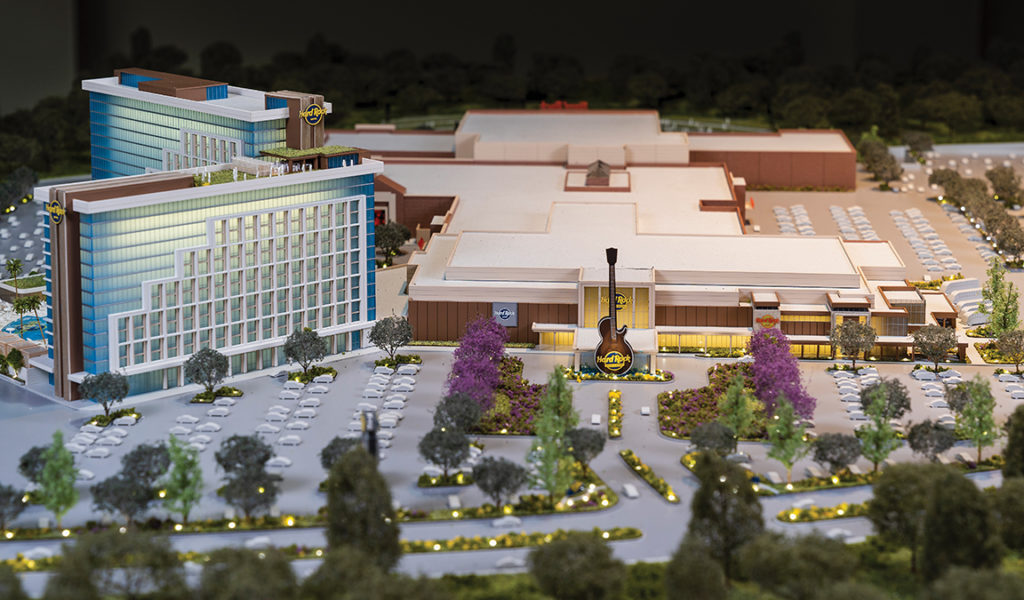
A Search for Employees
Bristol’s temporary casino, which opens in under two months, will require an army of employees to keep the place operating 24 hours a day, 7 days a week. Evangelista plans to hire 600 employees, to be exact, and has held hiring events in an effort to fill all those positions.
But as every business owner knows, the COVID-19 pandemic has ushered in a period where it is difficult to find employees, and Evangelista said Hard Rock’s Bristol property has not been immune to that trend. There are people who don’t show up for scheduled interviews, and it often takes 10 phone calls to get one applicant to show up.
“We feel we attracted a lot of people, but it’s still an environment I can’t explain,” she said. “I don’t know that anybody understands what’s going on in the world today, and on top of it, it’s an industry that requires 24/7 (availability), so I need flexibility from people to work nights and weekends and holidays. If you don’t want to work, those (hours) are also not attractive.”
Last fall, a national survey conducted by Morning Consult on behalf of the American Hotel & Lodging Association projected the hotel industry was down 500,000 jobs last year compared to 2019. That figure accounts for 10 years worth of job growth in the hospitality industry.
Locally, Christopher Perrin, marketing director for Discover Bristol, said last fall that a staffing shortage was hampering the recovery in our region.
“Some of the hoteliers could have been even better, but they were having trouble with staffing,” he said. “They were having to close off rooms because they didn’t have the staffing to turn all the rooms.”
Brenda Whitson, executive director of the Johnson City Convention & Visitors Bureau, said the recovery on the Tennessee side of the border has been better than it has been in many other states, but a lack of room attendants and food and beverage employees has kept local hotels from bouncing back fully. She expects the temporary casino to spread that segment of the workforce even thinner than it already is.
“I think it’s going to be difficult,” Whitson said. “You can see that now with so many of the service providers looking for people to work, and I think rate of pay has had to go up in order to get people to come to work, which is good. It’s good for (the employees). I think they deserve that.”
Evangelista is certainly sensitive to the concerns of those in the hospitality industry who are also looking for employees, particularly those in the hotel industry who wonder how the new Hard Rock Hotel – which is scheduled to open alongside the permanent casino in 2024 – will effect business. She recalled a recent conversation with a hotel salesperson who expressed concerns that Hard Rock would have no use for local partnerships with hoteliers once the new hotel is built.
But instead of viewing this as a fight for a finite amount of workers and revenue, Evangelista is adamant that Hard Rock will help grow the pie, allowing everyone to thrive in the process.
“If this business succeeds, we won’t have enough (hotels and restaurants),” she said. “There is no win for Hard Rock if we come in and the community doesn’t win.”
In the short term, Whitson projects a 5 percent increase in bookings for Johnson City hoteliers once the temporary casino opens. Beyond that, she expects the new casino to have a positive ripple effect on the tourism industry as time goes on.
“This is a whole new arena for us as a region, and we’re excited about it and the opportunity it’s going to bring,” Whitson said. “We see this as an opportunity for us to really go in and do some great event marketing to appeal to this profile of traveler to get them to come to Johnson City.”
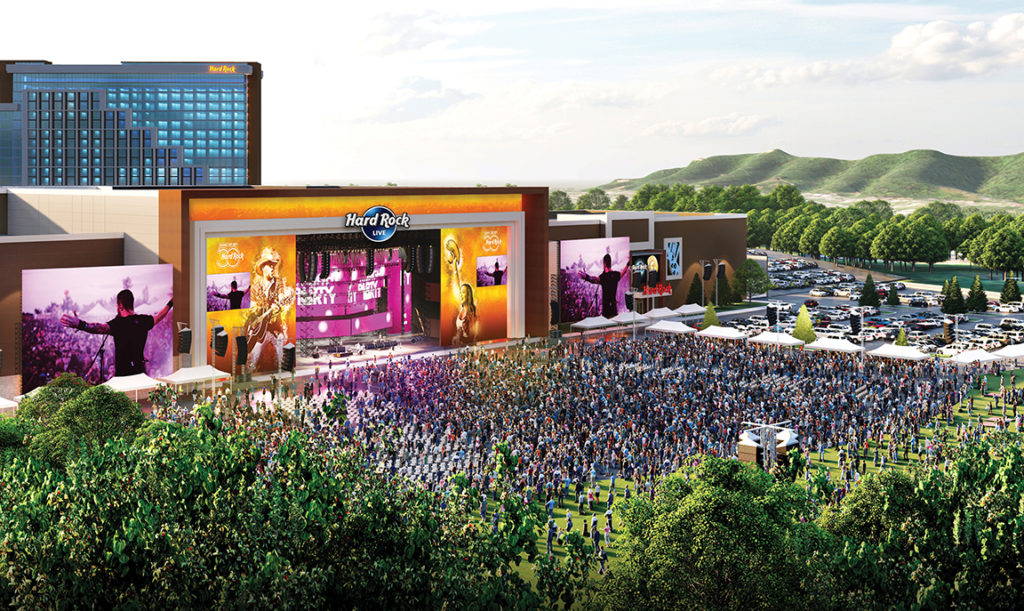
A Catalyst for Tourism
The cause of regionalism has faced a long road, but tourism is one area where municipal and county governments have found common ground. Hands have reached across city, county and even state lines to collaborate on tourism initiatives and to cross-promote all the tourism assets our region possesses.
The Northeast Tennessee Tourism Association is a manifestation of those efforts to market the region’s tourism assets as a whole, which executive director Alicia Phelps believes has put us on solid footing to make the most of the opportunity Hard Rock’s presence will present.
“As we’ve seen, when different industries and communities work together, the impact can be felt throughout the area,” Phelps said.
Phelps has already been fielding calls from folks outside the region asking her when the casino will open and what other things there are to do in the region. It is early evidence that Hard Rock’s new property has the potential to act as a magnet to draw tourists to our region and create opportunities for existing tourism assets to market to a captive audience.
“Bristol is already a tourist destination,” Eige said. “We know that. That’s one of the reasons Hard Rock was interested in this location, between (Bristol Motor Speedway) and country music and just the natural assets we have with the mountains and the rivers. This really helps create that snowball effect.”
Evangelista has met with the leaders of several existing tourist attractions in the region, including the Country Music Hall of Fame and Bristol Motor Speedway in an effort to get off on the right foot and develop good working relationships.
“I think what is important is, How do we make this a win-win for Hard Rock and the businesses that are already here and the ones that are coming?” Evangelista said. “Working together makes more sense.”
Jerry Caldwell, president of Bristol Motor Speedway, said he has been really encouraged the more he has been able to get to know the leadership at Hard Rock.
“I like their business philosophy,” Caldwell said. “They think a lot like we do. They want to do things first-class, and they want to do things big. One of our challenges over the years has been the hotels, motels, camping – whatever it is. We’re always wanting hotels and motels, but we also want to provide other things for folks to do when they’re in town, so I love the casino coming. Our Las Vegas property does a great job working with the casinos out there, and I see us having the same great relationship here.”
Phelps said Hard Rock reached out to her very soon after the referendum passed to start working on an excursions program aimed at putting together packages for Hard Rock guests to experience the other attractions that already exist in the region.
“We’re really excited to have the opportunity to work with them alongside our tourism partners,” Phelps said. “We already know that when a visitor comes, they’re going to spend around three or four days in an area, so folks will be crossing state and county and city lines and taking in what we have to offer.”
A Vehicle for Growth
Of course, some folks will stay longer than three or four days. The casino has already begun attracting workers from outside the region who now call the Appalachian Highlands home. Evangelista is one of them.
She had never heard of Bristol prior to her meeting with the leadership of the United Company last December, but she soon found herself drawn to the town and the opportunity to build a team from the ground up at Hard Rock’s newest property.
“I came here in December and sat in this room with them, learned the whole story of what happened in town over the years and what this would mean to the community,” Evangelista said. “That was really the decision factor. I wasn’t even excited about the location. On paper, Bristol is a little town, but you come here and it’s so much more than that.”
Evangelista wasn’t the only one who saw what she liked when she took a closer look at Bristol and the region as a whole. She said Hard Rock CEO Jim Allen was surprised to see so many internal candidates from Hard Rock’s other locations jumping at the chance to come work in Bristol.
“He didn’t understand why at first,” Evangelista said. “I have probably about five or six employees from Tampa already.”
Miles Burdine, CEO of the Kingsport Chamber, has already met with Evangelista and Marc DeLeo – Hard Rock’s vice president of marketing – on two occasions and is excited about the opportunities the casino will open up for Kingsport. He said he is already aware of relocated casino employees who have settled in Kingsport.
Across the border in Southwest Virginia, Will Payne – managing partner of Coalfield Strategies – has several economic development projects designed to both attract and retain young talent to the region, but almost all of them have been in search of a hub containing entertainment, recreation and other attractions that boost the quality of life.
In that sense, the casino project has the potential to be a silver bullet when it comes to encouraging growth in Southwest Virginia. If that materializes, it could be enough to tip the scales in the conversation about the lack of affordable housing.
“We need new moderate income housing,” Payne said. “The lack of housing stock is simply holding the region back from realizing its full potential.”
While the casino has the ability to bring in new people from outside our region, Eige believes it also has the ability to help us retain our best and brightest. A Bristol native, Eige lived and worked in Richmond for years before finally coming home just under five years ago.
He hopes his son can return to Bristol when he grows up, and he believes the casino may be an important piece in creating a vibrant region full of good opportunities for our young people.
“In order to retain our young professionals and children going off to college, we have to have a community that attracts young professionals and families and employees that aren’t from here,” Eige said.
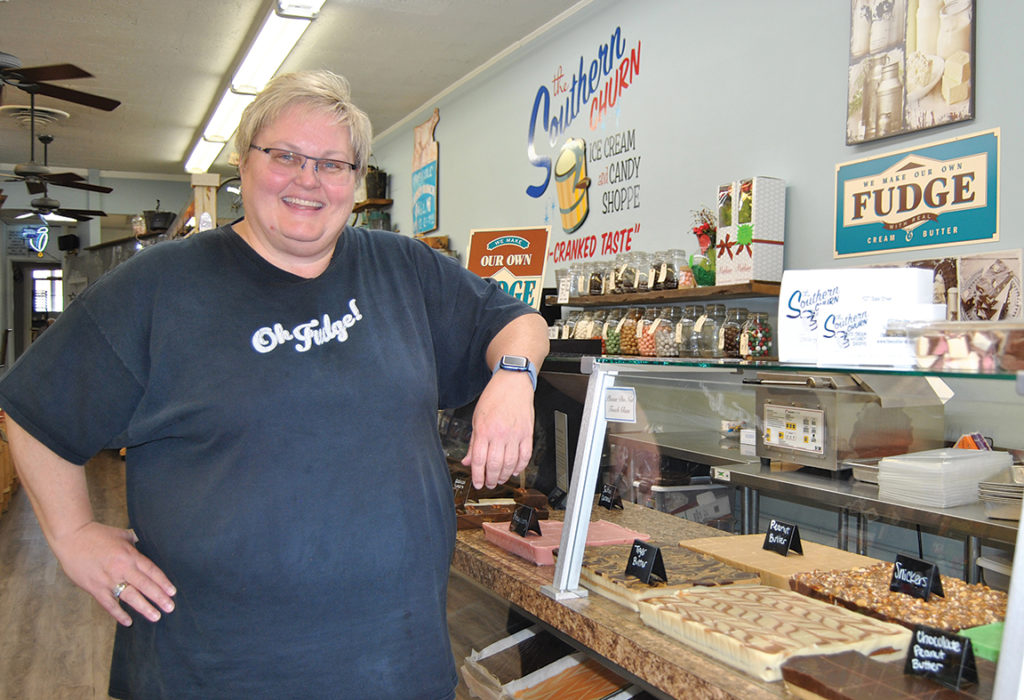
An Economic Development Engine
It might be easy for some existing businesses to look at the Hard Rock and see an existential threat, particularly if those businesses are in the hospitality, entertainment or tourism sectors.
But Karen Hester has another story to tell. Hester has owned The Southern Churn, and ice cream and candy shop on State Street, since 2014. Although the name screams ice cream, The Southern Churn is best known for its fudge.
When Hard Rock executives dropped by her store during a visit to Bristol, they happened to try her fudge. Before long, Hester and her staff were working hard to fill a large order for Hard Rock’s property in Tampa, Florida, in advance of the holidays.
She now supplies fudge to Hard Rock locations in Gary, Indiana and Cincinnati, Ohio in addition to Tampa, and of course, she expects the new casino in Bristol to keep her plenty busy when it opens.
“They took a chance on a small business,” Hester said. “I certainly didn’t think I’d be selling my products in Hard Rock casinos up and down the Eastern Seaboard. They could outsource everything, but that’s not their motto.”
Indeed, Evangelista is currently trying to find vendors to serve the needs of Hard Rock Bristol for years to come. For instance, she needs a bread supplier for the restaurant and wishes she could find one closer to the casino.
“There is a bread company in Knoxville that is bringing some samples,” she said. “Why is there not one in Johnson City?”
The ancillary businesses it takes to keep a casino running is one of the untold economic impacts of a project like the one in Bristol. Landscaping, pest control, snow removal, Uber drivers, IT support – the list goes on and on.
Payne is also excited about the role the casino could play in a couple key areas.
“The Hard Rock name instills confidence in CEOs unfamiliar with the area who are considering expanding to the area,” he said. “It will be a lightning bolt for upward mobility with new, sustainable higher-paying jobs.”
Business leaders in surrounding cities and towns are also aware of the pending economic impact of the casino. Burdine is convinced that “cross promotion opportunities abound” once the casino opens, and said Jud Teague, executive director of Visit Kingsport, anticipates a positive impact on Kingsport’s economy.
“The Kingsport Chamber is excited about the synergy that has been created by Hard Rock Hotel & Casino, and we are confident more businesses will open and expand in our region as a result,” Burdine said.
An Exercise in Regionalism
There was a time not so long ago that the idea of one municipality sharing tax revenue with another would have been unheard of. The fact that Bristol, Virginia has agreed to do just that is an important example of putting the talk of regionalism into action.
“Our delegation also wanted to ensure that the entire region benefited from this project,” O’Quinn said. “So there is a portion of the local tax revenue that will be divided amongst the localities in the Bristol transportation district. The Commonwealth will receive part of the revenue, Bristol obviously receives a large portion of it, but the other localities will benefit as well.”
While four casino projects have been approved in Virginia through public referendum, Eige pointed out that Bristol, Virginia is the only locality sharing a portion of its gaming tax revenue with others in the region. Eige said that was a credit to the Bristol City Council, which chose to look at the big picture.
O’Quinn noted that the fate of the project hinged on Bristol voters taking ownership by voting in favor of the casino.
“Our legislative delegation new this project could potentially have a huge economic impact for our region. However, we wanted to ensure that the local residents agreed and that is why we attached a public referendum to it.”
In many cities, a vote on whether to approve a casino is framed as a decision on whether to let outsiders come into the community and establish a lucrative business. That was not the case in Bristol, where Jim McGlothlin and Clyde Stacy spearheaded the effort.
“I think a lot of that goes to Jim McGlothlin and Clyde Stacy’s reputation in the community and that they’ve been local businessmen here for decades,” said Eige, who is active in the Bristol Chamber and is currently past chair for that organization. “They’ve created jobs here, and they’re based right here in Bristol. The referendum campaign almost became a community pride, Bristol pride campaign. It passed by 71 percent, which was the highest winning percentage of all the cities that had a casino referendum that year. I think that speaks volumes to how the community embraced this.”
As the temporary casino opens and eventually gives way to the permane
nt hotel and casino, Kent is confident everyone in our region will benefit from the cooperation that started in Bristol and has begun to fan out to communities on both sides of the state line.
“You’ve got the collective region that incorporates two states,” Kent said. “A lot of challenges come with that, but I hope we’re a catalyst of ensuring regionalism truly means our Tri-Cities region. There have been a lot of barriers as of late to break down as it relates to business and commerce, and I’m hopeful we help that process move forward because it is absolutely essential.”


